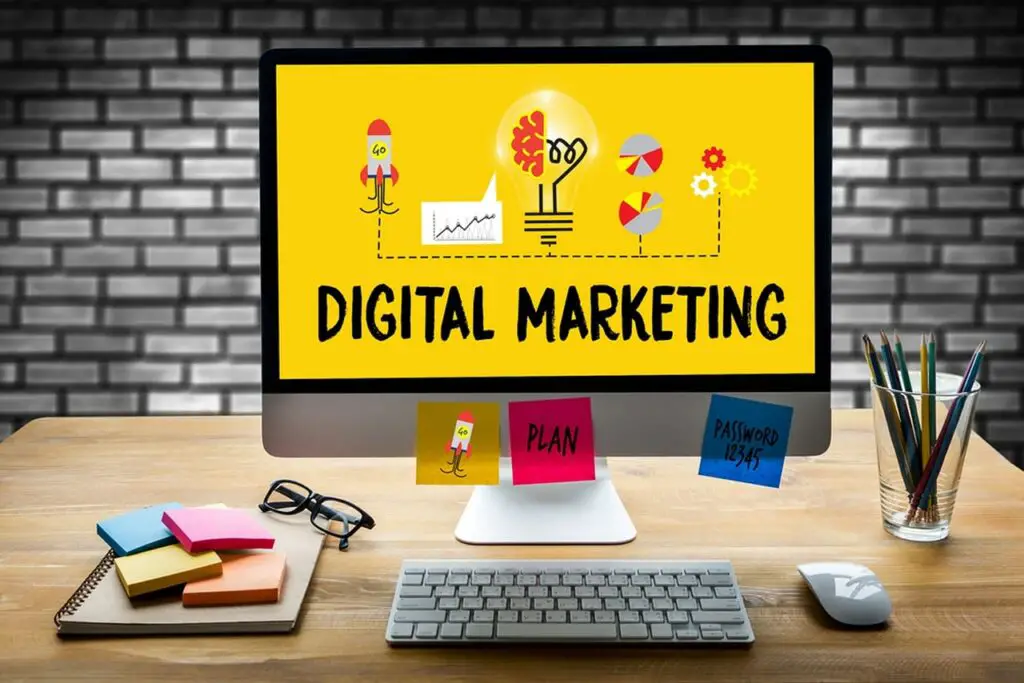In today’s digital age, it’s no secret that businesses need a strong online presence to thrive. Whether you’re a small startup or an established corporation, digital marketing services can play a crucial role in helping you reach your target audience, increase brand awareness, and drive conversions. This article dives deep into the world of digital marketing services, exploring the various strategies, techniques, and benefits they offer to businesses of all sizes. So, buckle up and get ready to supercharge your online success!
Why Digital Marketing Services Matter
In a world where consumers are spending more time online than ever before, digital marketing services have become indispensable for businesses looking to thrive in the digital landscape. Let’s explore the key reasons why investing in digital marketing services is crucial for your business’s success.
- Maximize Online Visibility: With millions of websites competing for attention, digital marketing services help your business stand out from the crowd. By employing strategies like search engine optimization (SEO), pay-per-click (PPC) advertising, and social media marketing, you can increase your online visibility and reach a wider audience.
- Build Brand Awareness: Building a strong brand is essential for establishing trust and loyalty among your target audience. Through targeted digital marketing campaigns, you can create brand awareness and recognition, ensuring that your business remains top of mind when customers are ready to make a purchase.
- Drive Website Traffic: Your website serves as a virtual storefront, and digital marketing services can help drive quality traffic to your online presence. By optimizing your website for search engines, running targeted ads, and leveraging social media platforms, you can attract visitors who are genuinely interested in what you have to offer.
- Increase Conversions: Converting website visitors into paying customers is the ultimate goal of any business. Digital marketing services provide valuable tools and techniques to enhance your conversion rates. Whether through persuasive content, optimized landing pages, or personalized email campaigns, these services can turn leads into loyal customers.
- Measure and Analyze Results: One of the greatest advantages of digital marketing services is the ability to track and measure your campaign’s performance. With detailed analytics and data-driven insights, you can continuously refine your strategies to maximize results and achieve a higher return on investment (ROI).
Search Engine Optimization (SEO)
When it comes to digital marketing services, search engine optimization (SEO) takes center stage. SEO aims to improve your website’s organic visibility on search engine results pages (SERPs) by optimizing various factors that influence search engine rankings.
SEO encompasses a range of techniques, including:
- Keyword Research: Identifying and targeting relevant keywords that align with your business and audience’s search intent.
- On-Page Optimization: Optimizing elements on your web pages, such as meta tags, headings, and content, to improve their relevance and visibility to search engines.
- Link Building: Acquiring high-quality backlinks from reputable websites to enhance your website’s authority and trustworthiness.
- Technical SEO: Ensuring your website has a solid foundation by optimizing its technical aspects, including site speed, mobile-friendliness, and crawlability.
By implementing a comprehensive SEO strategy, your website can climb the search engine rankings, driving more organic traffic and potential customers to your digital doorstep.
Pay-Per-Click Advertising (PPC)
While SEO focuses on organic search results, pay-per-click (PPC) advertising offers a way to capture immediate visibility on search engines through paid ads. PPC campaigns involve bidding on relevant keywords, and you only pay when a user clicks on your ad.
PPC advertising offers several benefits, including:
- Instant Visibility: Unlike SEO, where it can take time to see results, PPC ads can appear at the top of search results almost instantly, ensuring immediate visibility for your business.
- Precise Targeting: PPC platforms provide advanced targeting options, allowing you to narrow down your audience based on factors like demographics, interests, and even specific search terms.
- Measurable ROI: With PPC, you can track the performance of your ads in real-time, measuring metrics like click-through rate (CTR), conversion rate, and cost per acquisition (CPA), enabling you to make data-driven decisions and optimize your campaigns accordingly.
When combined with a robust SEO strategy, PPC advertising can provide a powerful one-two punch for maximizing your online reach and generating qualified leads.
Social Media Marketing
Social media platforms have revolutionized the way businesses connect with their audience. With billions of users worldwide, social media marketing has emerged as a vital digital marketing service to engage, entertain, and convert potential customers.
Key aspects of social media marketing include:
- Content Creation: Crafting compelling and shareable content that resonates with your target audience across social media platforms.
- Community Building: Building a loyal community of followers by fostering meaningful interactions and conversations.
- Influencer Partnerships: Collaborating with influencers and industry leaders to amplify your brand’s reach and credibility.
- Paid Advertising: Running targeted social media ad campaigns to expand your reach and drive traffic to your website or landing pages.
- Social Listening: Monitoring social media channels to gain insights into consumer sentiment, identify trends, and respond to customer feedback.
By leveraging the power of social media, businesses can create a strong online presence, foster brand loyalty, and drive meaningful engagement with their audience.
Content Marketing
In the digital realm, content is king. Content marketing focuses on creating and distributing valuable, relevant, and consistent content to attract and retain a clearly defined target audience. By providing valuable information and addressing pain points, businesses can establish themselves as industry authorities and nurture relationships with potential customers.
Key elements of an effective content marketing strategy include:
- Blogging: Publishing informative blog posts that address your audience’s needs, concerns, and interests.
- Video Content: Creating engaging video content, such as tutorials, product demonstrations, and behind-the-scenes glimpses, to capture attention and drive engagement.
- Infographics: Presenting complex information in a visually appealing and easy-to-digest format to enhance audience understanding and shareability.
- E-books and Guides: Offering in-depth resources that provide value and establish your brand’s expertise.
- Guest Blogging: Collaborating with industry influencers or reputable websites to contribute guest posts and reach a wider audience.
By consistently delivering high-quality content, businesses can position themselves as trusted sources of information, attract organic traffic, and nurture leads through the sales funnel.
Email Marketing
While some may argue that email is outdated, it remains one of the most effective digital marketing channels for businesses. Email marketing allows you to directly connect with your audience, nurture leads, and drive conversions.
Effective email marketing campaigns involve:
- Segmentation: Dividing your audience into segments based on demographics, behavior, or purchase history to deliver personalized and targeted messages.
- Automation: Setting up automated email sequences to nurture leads, welcome new subscribers, or recover abandoned carts.
- Personalization: Tailoring email content to address individual preferences and needs, increasing the chances of engagement and conversion.
- A/B Testing: Experimenting with different subject lines, CTAs, and content to optimize email performance and maximize open and click-through rates.
- Analytics and Tracking: Monitoring key email metrics, such as open rates, click-through rates, and conversion rates, to measure the effectiveness of your campaigns.
Email marketing offers a cost-effective way to stay top of mind with your audience, nurture leads, and drive repeat purchases.
Influencer Marketing
Influencer marketing has gained significant traction in recent years, capitalizing on the popularity and reach of social media influencers. By partnering with influencers who have a relevant and engaged audience, businesses can leverage their influence to promote products or services and increase brand visibility.
When implementing influencer marketing campaigns, consider:
- Relevance: Choose influencers whose niche aligns with your brand and target audience to ensure maximum impact and engagement.
- Authenticity: Seek influencers who genuinely resonate with their audience and align with your brand’s values, as authenticity is crucial for building trust.
- Content Collaboration: Collaborate with influencers to create content that seamlessly integrates your brand message while resonating with their audience.
- Trackable Metrics: Set clear goals and metrics to measure the success of your influencer marketing campaigns, such as engagement rates, reach, and conversions.
- Compliance: Ensure that influencer partnerships adhere to legal guidelines and disclosure requirements to maintain transparency and credibility.
By harnessing the power of influential personalities, businesses can tap into new audiences, gain social proof, and increase brand awareness.
Conversion Rate Optimization (CRO)
Conversion rate optimization (CRO) focuses on improving the percentage of website visitors who take the desired action, such as making a purchase, filling out a form, or subscribing to a newsletter. By analyzing user behavior, testing different elements, and making data-driven changes, CRO helps maximize the effectiveness of your digital marketing efforts.
Key elements of CRO include:
- User Experience (UX) Design: Creating a seamless and intuitive website experience that guides visitors toward conversion.
- A/B Testing: Experimenting with different variations of website elements, such as headlines, call-to-action buttons, and layouts, to identify the most effective combination.
- Heatmaps and User Recordings: Analyzing user behavior on your website to identify pain points, areas of interest, and opportunities for improvement.
- Optimized Landing Pages: Designing dedicated landing pages that are focused on a specific offer or goal, ensuring clarity and reducing distractions.
- Clear and Compelling CTAs: Crafting persuasive and visually prominent call-to-action buttons and copy that encourage users to take the desired action.
By continuously optimizing your website and conversion funnel, you can drive more conversions, increase revenue, and maximize the ROI of your digital marketing efforts.
Online Reputation Management (ORM)
In today’s interconnected world, managing your online reputation is crucial for maintaining trust and credibility with your audience. Online reputation management (ORM) involves monitoring and influencing your brand’s reputation on digital platforms, ensuring positive sentiment and mitigating any negative reviews or comments.
Key aspects of ORM include:
- Social Listening: Monitoring social media channels, online forums, and review websites to stay aware of what customers are saying about your brand.
- Review Management: Responding promptly and professionally to customer reviews, whether positive or negative, to demonstrate your commitment to customer satisfaction.
- Crisis Management: Developing strategies to handle and address any potential crises or negative incidents that could impact your brand’s reputation.
- Content Strategy: Creating and promoting positive content, such as customer success stories or thought leadership articles, to enhance your brand’s online presence and reputation.
ORM ensures that your brand’s online reputation remains positive and reinforces customer trust, ultimately driving business growth.
Mobile Marketing
With the rise of smartphones and mobile internet usage, mobile marketing has become an essential component of any digital marketing strategy. Mobile marketing focuses on reaching and engaging users on their mobile devices through various channels and tactics.
Key mobile marketing strategies include:
- Mobile-Friendly Website: Designing and optimizing your website to provide a seamless browsing experience on mobile devices, with fast loading times and intuitive navigation.
- Mobile Advertising: Running mobile-specific ad campaigns, such as in-app ads or mobile display ads, to target users on their smartphones or tablets.
- SMS Marketing: Leveraging SMS (Short Message Service) to deliver targeted promotions, exclusive offers, or important updates directly to users’ mobile devices.
- Location-Based Marketing: Using geolocation technology to deliver targeted offers or notifications based on a user’s physical location.
- Mobile Apps: Developing a branded mobile app that provides value to users, enhances engagement, and increases brand loyalty.
By optimizing your digital presence for mobile users, you can reach a wider audience and capitalize on the growing trend of mobile internet usage.
Video Marketing
Video has become an incredibly popular and effective form of content, capturing attention and delivering messages in a highly engaging manner. Video marketing involves creating and distributing videos that promote your brand, products, or services across various platforms.
Key elements of video marketing include:
- Explainer Videos: Creating concise and informative videos that explain your product or service’s features, benefits, and value proposition.
- Tutorial and How-To Videos: Providing step-by-step instructions or demonstrations to help users understand how to use your product or solve a problem.
- Behind-the-Scenes Videos: Offering a glimpse behind the scenes of your business or showcasing the people and processes that make your brand unique.
- Customer Testimonials: Sharing authentic and compelling customer testimonials in video format to build trust and social proof.
- Live Videos: Engaging with your audience in real-time through live streaming events, Q&A sessions, or product launches.
Video marketing allows businesses to tell their story, evoke emotions, and foster meaningful connections with their audience.
Conclusion
Digital marketing services have revolutionized the way businesses promote their products and services. From search engine optimization and pay-per-click advertising to social media marketing and content creation, these services provide a comprehensive toolkit to drive online visibility, engage with customers, and generate tangible results. By leveraging the power of digital marketing, businesses can stay competitive in the digital landscape, expand their reach, and achieve sustainable growth.



